“The best way to predict the future is to invent it.” – Alan Kay. This quote perfectly captures the essence of how artificial intelligence is reshaping healthcare. AI agents are becoming indispensable tools, transforming how patient data is analyzed and workflows are managed. They are not just futuristic concepts but practical solutions addressing today’s challenges.
AI and automation can boost staff productivity by 10 times across healthcare functions, making processes faster and more efficient1. For instance, primary care physicians spend over seven hours on electronic health record tasks for every eight hours of patient appointments1. By integrating AI, these administrative burdens can be reduced, allowing more time for patient care.
Chronic diseases affect 60% of adults in the USA, with healthcare costs reaching $3.3 trillion annually2. AI tools are proving effective in early disease detection, such as predicting diabetes and identifying conditions like pneumonia through medical imaging2. This innovation is not only improving outcomes but also reducing costs.
This article explores how AI agents are revolutionizing healthcare, from enhancing efficiency to improving patient outcomes. It’s a comprehensive guide to understanding their impact and potential.
Key Takeaways
- AI agents significantly boost productivity in healthcare organizations.
- They reduce administrative burdens, allowing more focus on patient care.
- AI tools aid in early disease detection and chronic disease management.
- Integration of AI improves workflow efficiency and reduces costs.
- This guide covers the transformative impact of AI in healthcare.
Introduction to AI in Healthcare
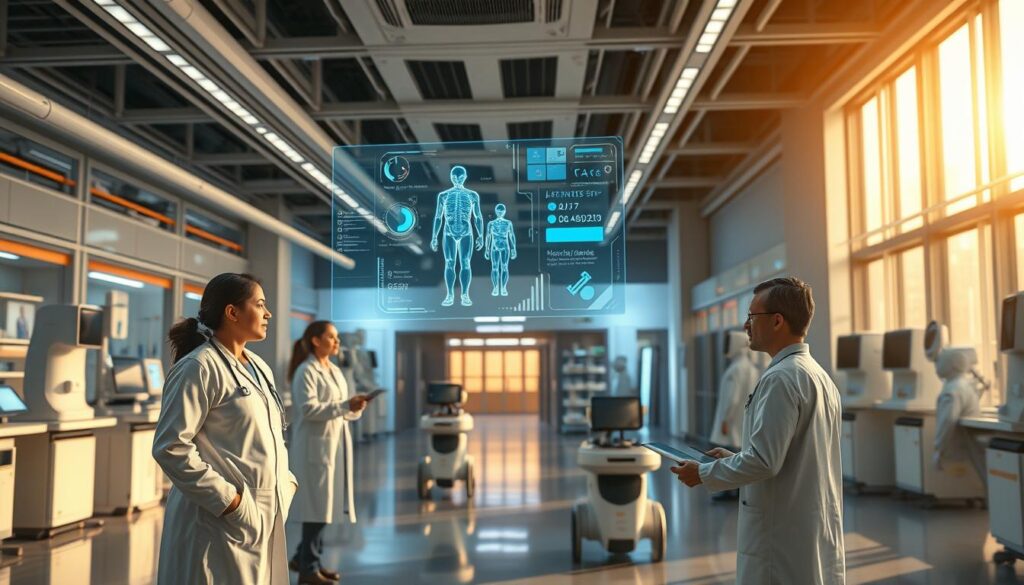
From simple rule-based systems to advanced machine learning, AI’s journey in medicine is remarkable. Its roots trace back to the Dartmouth Conference, where early ideas laid the foundation for what would become a transformative force in healthcare. Over time, artificial intelligence has evolved from academic research to practical clinical applications, reshaping how care is delivered.
Evolution of AI in Medicine
Initially, AI relied on rule-based systems, which followed predefined logic to solve problems. These systems were limited but paved the way for more sophisticated approaches. With the advent of machine learning, algorithms began to learn from data, improving their accuracy and adaptability. Today, AI can analyze unstructured medical data, including radiology images and blood tests, to provide deeper insights3.
For example, AI-powered neural networks now match human radiologists in detecting breast cancer4. This shift from manual analysis to automated tools has revolutionized diagnostics, making them faster and more precise. Healthcare providers are increasingly integrating these technologies to enhance decision-making and streamline workflows.
Understanding the Impact on Patient Care
Artificial intelligence has significantly improved patient care by enabling early disease detection and personalized treatment. For instance, AI algorithms can predict severe sepsis in premature babies with 75% accuracy4. Such advancements reduce errors and improve outcomes, ensuring patients receive timely interventions.
Additionally, AI tools like GRAIL’s Galleri test screen for cancer signals in a single blood test, offering a non-invasive diagnostic option3. These innovations not only enhance diagnostic accuracy but also empower healthcare providers to deliver more effective care. By automating administrative tasks, AI allows clinicians to focus more on patient needs, improving overall health outcomes.
The Role of AI Agents in Modern Healthcare Systems
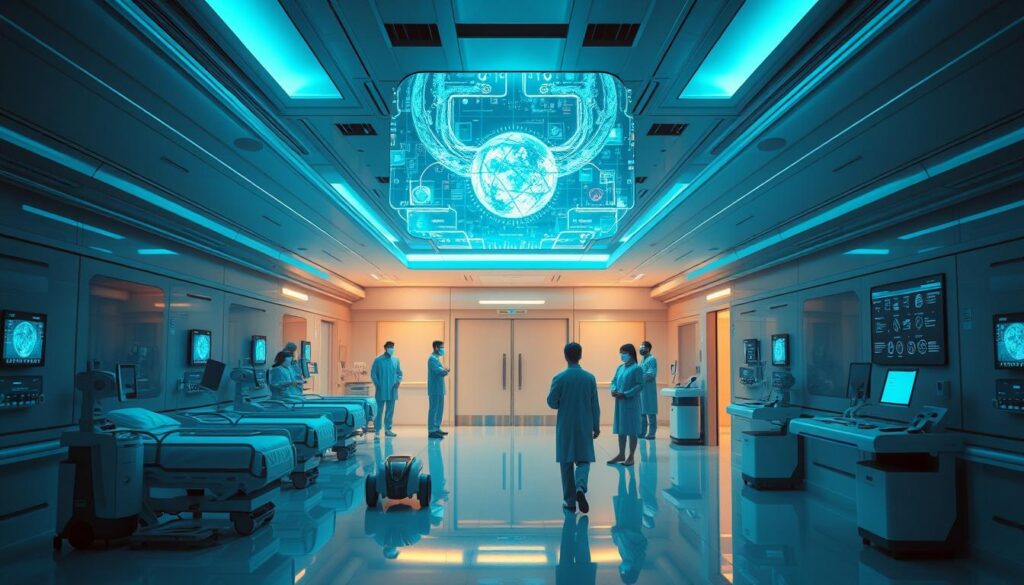
Artificial intelligence is reshaping clinical workflows, offering innovative solutions to long-standing challenges. By analyzing vast amounts of patient data, these tools provide critical support to healthcare professionals, enabling faster and more accurate decision-making5.
AI agents streamline processes by automating repetitive tasks, such as appointment scheduling and EHR management. This reduces administrative burdens, allowing clinicians to focus more on patient care5. For example, AI systems can process genetic information and medical records to enhance diagnostic accuracy, leading to quicker and more precise diagnoses5.
Patient-centric applications of AI are transforming care delivery. Tools like telemedicine platforms and virtual assistants improve engagement and satisfaction by enhancing communication between patients and providers5. Additionally, AI-powered systems can monitor real-time data from wearable devices, alerting healthcare teams to irregularities in patient conditions5.
Modern healthcare systems increasingly rely on AI to handle complex tasks efficiently. From predicting disease outbreaks to accelerating drug discovery, these technologies are driving significant improvements in care quality and operational efficiency5. By integrating AI, organizations can optimize resource allocation and improve overall outcomes6.
Real-world examples highlight the transformative impact of AI agents. For instance, the IDx-DR algorithm demonstrates 87% sensitivity and 90% specificity in detecting diabetic retinopathy, a condition affecting millions7. Such advancements underscore the potential of AI to revolutionize healthcare delivery and improve patient lives.
Understanding AI-Powered Healthcare Agents

Healthcare is evolving rapidly with the integration of advanced technologies. These tools are designed to enhance efficiency, improve accuracy, and support both providers and patients. Among these innovations, AI-powered healthcare agents stand out for their ability to process vast amounts of data and deliver actionable insights.
Core Functionalities and Capabilities
AI-powered healthcare agents excel in data processing and predictive analytics. They can analyze patient records, genetic information, and medical history to provide accurate diagnoses8. These systems also enable real-time monitoring, alerting providers to irregularities in patient conditions8.
For example, wearable devices equipped with AI agents can track vital signs and activity levels, offering personalized health insights9. This capability not only improves patient engagement but also ensures timely interventions8.
Digital Assistants in Clinical Practice
Digital assistants are transforming clinical workflows by automating repetitive tasks. They handle appointment scheduling, medical billing, and coding, reducing administrative burdens8. This allows clinicians to focus more on patient care, improving overall efficiency9.
These assistants also support patients by providing around-the-clock guidance. They answer questions, remind patients to take medications, and monitor adherence to treatment plans8. Such features enhance patient satisfaction and outcomes9.
By integrating large datasets, AI-powered agents enable personalized medicine. They predict drug responses and identify genetic predispositions, ensuring tailored treatment plans8. This approach not only improves care quality but also reduces costs9.
Transparent and Responsible AI in Clinical Settings
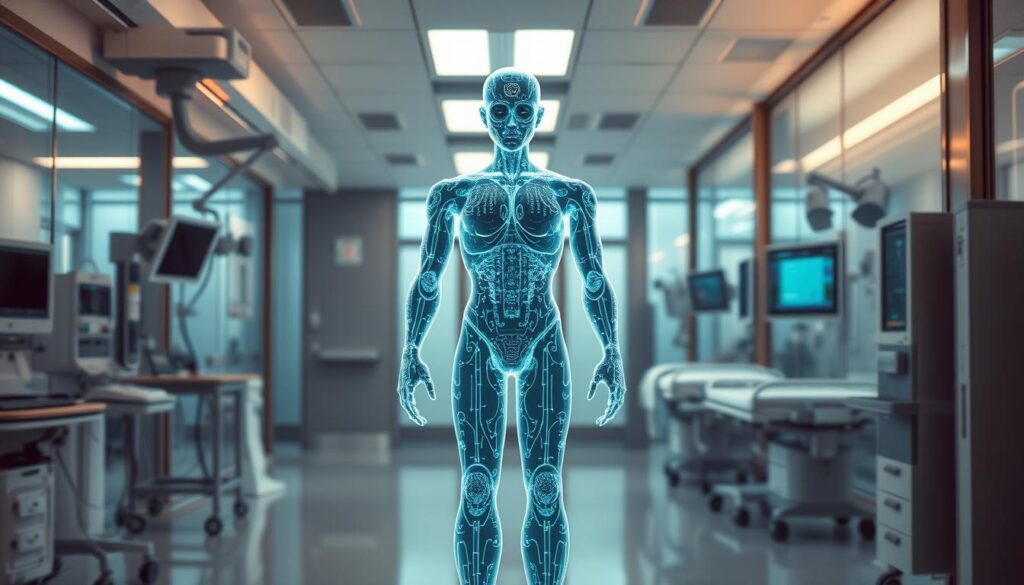
Transparency and responsibility are critical when integrating advanced technologies into clinical settings. Building trust among clinicians and patients requires clear communication about how these systems operate. Without transparency, adoption of innovative tools can face resistance, hindering their potential to improve care.
Building Trust through Transparency
Trust is foundational in healthcare. Clinicians and patients need to understand how AI systems make decisions. For example, tools trained on vetted medical content ensure reliability and accuracy10. Greg Samios, a healthcare leader, emphasizes,
“Transparency in AI operations is non-negotiable for fostering trust and ensuring ethical use.”
Responsible platforms utilize evidence-based content validated by clinical experts10. This approach minimizes errors and ensures that patient outcomes remain the priority. Continuous testing, such as calculating F1 scores, further enhances reliability10.
Ensuring Patient Safety and Oversight
Patient safety is paramount in healthcare. AI systems must operate under human oversight to prevent errors and ensure accountability. For instance, integrating feedback from clinicians and patients helps refine AI models for better performance10.
Healthcare systems are implementing measures to safeguard patient safety. These include regular audits, real-time monitoring, and adherence to rigorous standards10. Such practices not only enhance safety but also improve patient engagement by fostering confidence in these technologies.
By prioritizing transparency and responsibility, healthcare systems can harness the full potential of AI. This approach ensures that patient outcomes are prioritized, leading to better care and improved trust in modern medicine.
Advancements in Clinical Decision Support Systems

Clinical decision support systems are undergoing a transformative shift with the integration of advanced technologies. These systems now leverage artificial intelligence to enhance efficiency, accuracy, and patient outcomes. By combining data-driven insights with real-time analytics, they are reshaping how clinicians make decisions11.
AI-Enhanced Search for Faster Insights
One of the most significant advancements is the use of AI-enhanced search capabilities. These tools allow clinicians to access evidence-based insights rapidly, reducing the time needed to answer critical clinical questions11. For example, AI-driven search engines can analyze vast datasets, including medical literature and patient records, to provide actionable recommendations in seconds.
This application not only improves decision-making but also reduces administrative burdens. Clinicians can focus more on patient care rather than spending hours searching for information11.
Analytics Driving Organizational Decisions
Advanced analytics are another key component of modern clinical decision support systems. These tools transform unstructured data into actionable dashboards, offering healthcare leaders new visibility into system performance11. By identifying care gaps and regional variances, they enable data-driven operational decisions that enhance efficiency and patient outcomes.
For instance, AI-powered analytics can predict patient demand and optimize therapy selection in emergency departments. This reduces waiting times and improves overall care delivery12.
As these systems continue to evolve, they are setting new standards for clinical efficiency and patient-centered care. Their integration into healthcare workflows is a testament to the transformative potential of artificial intelligence.
Transforming Patient Care with AI

Emerging technologies are reshaping how care is delivered, offering tailored solutions for better outcomes. These advancements are driving personalized medicine initiatives, ensuring treatments are more precise and effective13.
Real-time data analysis plays a crucial role in improving care delivery. By analyzing patient information, these tools provide actionable insights, enabling timely interventions13. For instance, AI-powered platforms can predict potential health risks, allowing providers to act before conditions worsen.
Increased precision in treatment recommendations is another significant benefit. AI systems analyze vast datasets to identify the most effective therapies, reducing trial and error13. This approach not only enhances outcomes but also minimizes side effects, ensuring patients receive the best possible care.
Technology is also creating more responsive and adaptive systems. AI-driven tools monitor patient conditions continuously, alerting providers to irregularities13. This proactive approach ensures that care is delivered when it’s needed most, improving overall health outcomes.
Real-world examples highlight the impact of these innovations. For instance, AI-assisted diagnostics have improved accuracy in detecting diseases like cancer, leading to faster interventions13. Such advancements underscore the potential of technology to redefine patient care and drive excellence in health delivery.
Streamlining Healthcare Operations through AI Integration
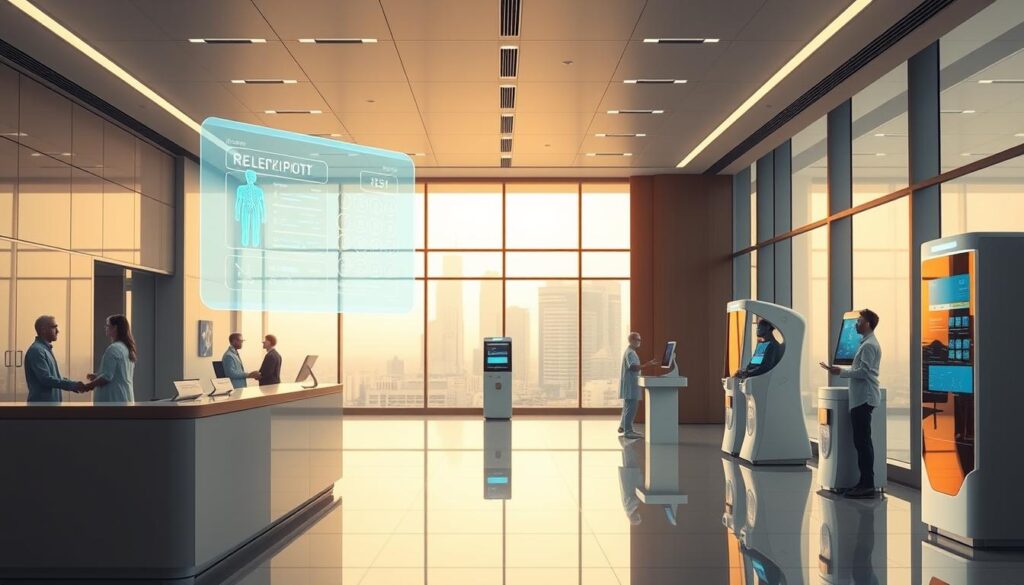
Efficiency in healthcare is reaching new heights with the integration of advanced technologies. These innovations are transforming how healthcare providers manage workflows, reducing administrative burdens, and improving patient care. By leveraging these tools, facilities can optimize operations and focus more on delivering quality services.
EHR Integration and Workflow Optimization
Electronic health records (EHR) are a cornerstone of modern healthcare. Integrating advanced technologies into EHR systems simplifies data management and enhances workflow efficiency. For instance, automated data entry reduces errors and saves time, allowing clinicians to focus on patient care14.
This model of integration also standardizes clinical practices across facilities. By using consistent protocols, healthcare teams can collaborate more effectively, ensuring better outcomes for patients15.
Reducing Administrative Burdens
Administrative tasks often consume valuable time that could be spent on patient care. Advanced tools automate repetitive tasks like scheduling, billing, and coding. This not only increases operational efficiency but also reduces costs by up to 25%14.
For example, hospitals utilizing these solutions report a 50% reduction in wait times, improving patient satisfaction14. By streamlining these processes, healthcare providers can dedicate more time to their practice, enhancing overall care quality.
These advancements are revolutionizing how facilities operate. By adopting these tools, healthcare systems can achieve greater efficiency and deliver better patient outcomes. To learn more about how these technologies are transforming care, visit this resource.
AI Agents in Diagnostics and Medical Imaging
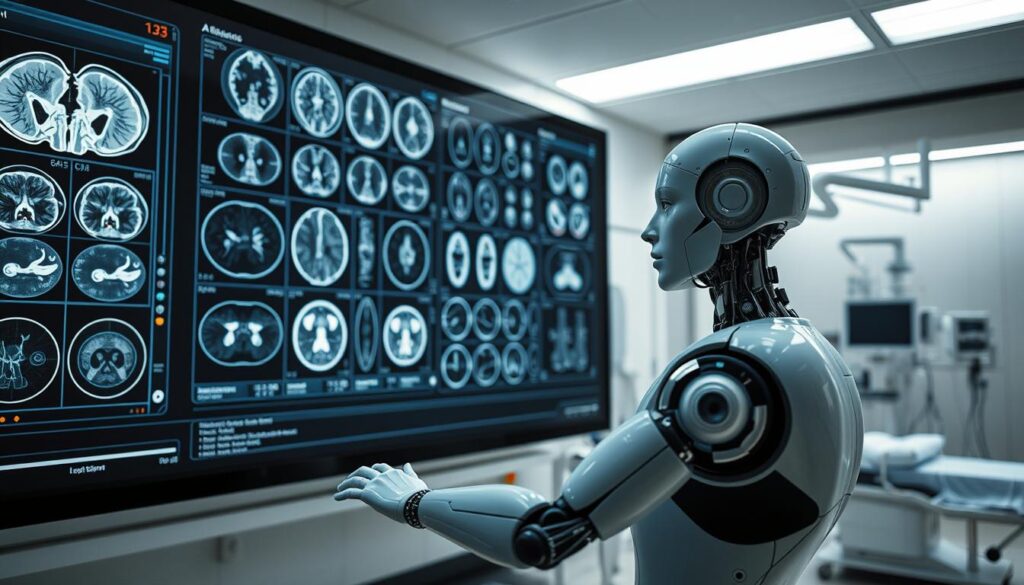
Medical imaging is undergoing a transformation thanks to innovative tools. These advancements are enabling faster and more accurate disease detection, significantly improving patient outcomes. By leveraging artificial intelligence, healthcare providers can now analyze complex imaging data with unprecedented precision.
Accelerating Disease Diagnosis
AI-driven diagnostics are reducing false positives and false negatives in imaging. Studies show that these tools can cut diagnosis time by up to 50%, allowing for quicker interventions16. For example, algorithms trained on large datasets achieve accuracy rates exceeding 90% in tasks like tumor detection16.
The integration of machine learning techniques has further enhanced early disease detection. Models improve their accuracy over time, with reported precision increases of up to 20% after training16. This capability is particularly valuable in identifying critical conditions like cancer at earlier stages.
Automated tasks in imaging, such as segmentation and classification, streamline workflows. These processes reduce radiologists’ workloads by up to 40%, enabling them to focus on complex cases16. As a result, decision-making in clinical settings becomes faster and more efficient.
Real-world examples highlight the impact of these innovations. AI-powered tools have increased early detection rates by 25%, leading to improved patient outcomes16. By embracing these technologies, healthcare systems are setting new standards for diagnostic accuracy and care delivery.
Revolutionizing Personalized Treatment and Patient Engagement
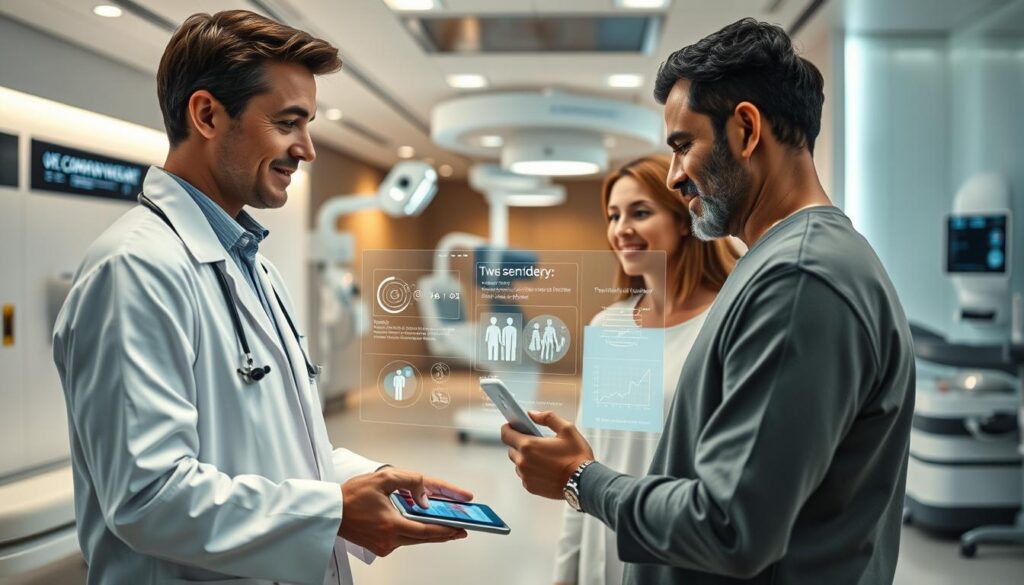
Personalized treatment is taking a leap forward with advanced technologies. These innovations are enabling healthcare providers to deliver tailored solutions that meet individual needs. By leveraging data-driven insights, treatments are becoming more precise and effective17.
Tailored Treatment Recommendations
Modern tools analyze patient profiles and clinical data to create customized treatment plans. This approach ensures that each patient receives care tailored to their unique health conditions. For example, algorithms achieve up to 90% accuracy in identifying high-risk individuals, allowing for early interventions17.
Personalized medicine not only improves outcomes but also reduces healthcare costs. By predicting responses to specific therapies, these tools minimize trial and error, ensuring efficient resource allocation18.
Enhancing Patient-Provider Communication
Real-time communication tools are transforming how providers interact with patients. AI-driven chatbots handle routine inquiries, reducing wait times and improving engagement17. This benefit allows clinicians to focus on complex cases while ensuring patients receive timely support.
Case studies show that improved communication leads to better health outcomes. For instance, telemedicine solutions enhance satisfaction by reducing travel time and increasing convenience18. These tools foster trust and collaboration between patients and their care teams.
By offering actionable insights, these technologies empower both patients and clinicians. They ensure that care is not only personalized but also responsive to evolving needs17.
Optimizing Clinical Laboratory Testing with AI

Clinical laboratory testing is becoming more efficient with the help of advanced technologies. These tools automate analytical processes, reducing errors and speeding up diagnostics19. By handling repetitive tasks, they free up lab technicians to focus on complex cases, improving overall workflow efficiency.
One of the most significant benefits is the reduction in test turnaround times. Automated systems can process samples faster, delivering results to patients in record time20. This capability ensures timely interventions, which is critical for conditions requiring urgent care.
AI also excels in managing and interpreting large volumes of lab data. It identifies patterns and anomalies that might be missed by human observers, enhancing diagnostic accuracy19. For example, machine learning algorithms can detect subtle changes in blood tests, flagging potential health risks early.
Streamlined laboratory processes lead to better patient care and satisfaction. Faster, more reliable results mean patients receive appropriate treatments sooner20. This not only improves outcomes but also fosters trust in healthcare providers.
Real-world examples highlight the impact of these innovations. AI-driven tools have reduced diagnostic errors by up to 30%, ensuring more accurate results19. By embracing these technologies, clinical labs are setting new standards for efficiency and reliability.
Integration of AI and Genomic Data for Precision Medicine
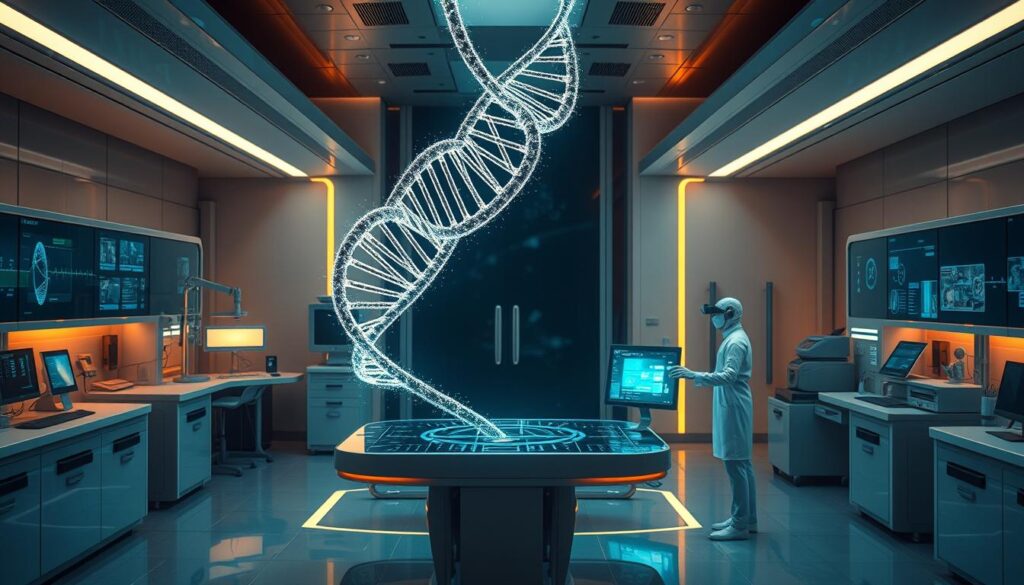
The fusion of AI and genomic data is unlocking new possibilities in precision medicine. By analyzing vast datasets, these technologies are transforming how treatments are tailored to individual patients. This application of AI is particularly impactful in identifying genetic markers and predicting disease risks21.
Predictive analytics plays a crucial role in this process. Machine learning algorithms analyze genomic data to identify patterns and optimize treatment plans22. For example, AI can predict patient responses to chemotherapy based on gene expression data, improving outcomes across multiple drugs22.
Leveraging Predictive Analytics in Genomics
AI excels in processing large genomic datasets, revealing disease patterns that were previously undetectable. This capability enhances diagnostic accuracy and ensures treatments are more effective21. By integrating genomic insights with clinical data, healthcare providers can create a seamless workflow that improves patient care22.
One breakthrough in precision medicine is the use of AI to avoid unnecessary treatments. For instance, precision genomics has enabled chemotherapy alone for certain tumor subgroups, eliminating the need for radiation therapy22. Such advancements highlight the transformative potential of combining AI with genomic data.
These innovations are not just improving outcomes but also reducing costs. By predicting drug responses and identifying genetic predispositions, AI ensures resources are allocated efficiently21. This approach is setting new standards in healthcare, making precision medicine more accessible and effective.
Leveraging AI Agents for Healthcare Resource Management
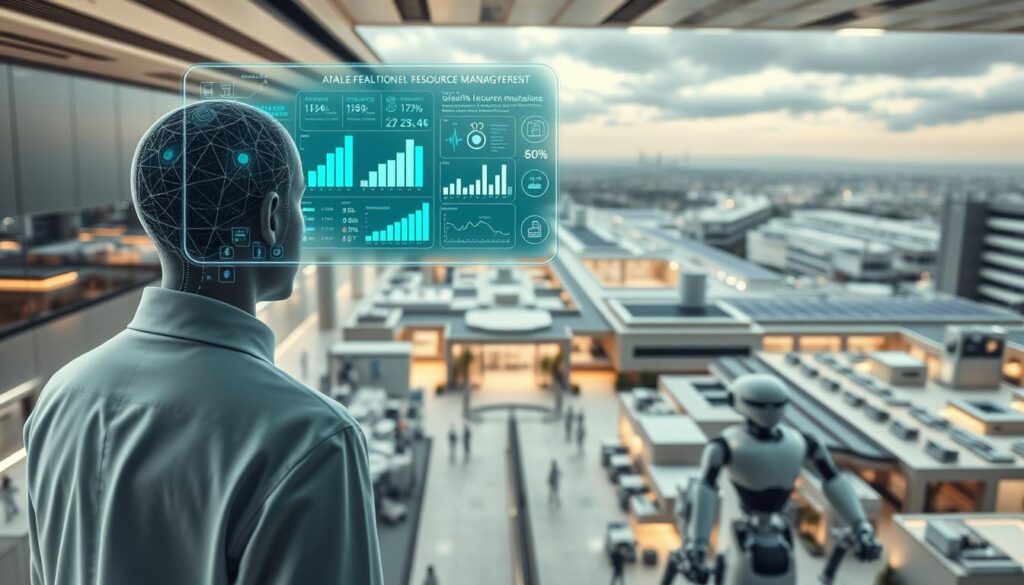
Efficient resource allocation is critical in today’s healthcare environment. AI agents are transforming how facilities manage resources, from bed assignments to staff scheduling. By automating these processes, they reduce operational costs and improve overall efficiency23.
One key solution is optimizing scheduling. AI-driven systems analyze historical data to predict patient demand, ensuring resources are allocated effectively23. This approach minimizes wait times and enhances patient satisfaction.
Data-driven tools also improve the healthcare environment. By monitoring real-time data, AI agents identify inefficiencies and suggest actionable improvements24. For example, predictive analytics can reduce inventory holding costs by up to 30%, ensuring essential supplies are always available24.
Real-life examples highlight the impact of these innovations. Hospitals using AI for resource management report a 20% increase in operational efficiency24. This allows staff to focus more on patient care, improving outcomes.
Scalable AI solutions are essential to meet evolving healthcare demands. As facilities grow, these tools adapt, ensuring consistent performance and cost savings25. To learn more about how AI is transforming healthcare, visit this resource.
Innovative Use Cases of AI in Healthcare Delivery

Digital innovations are reshaping how care is delivered, offering tailored solutions for better outcomes. These advancements are not just theoretical; they are actively transforming patient experiences and improving operational efficiency. From telehealth to virtual assistants, the ability of these tools to enhance healthcare delivery is undeniable.
Telehealth and Remote Monitoring
Telehealth has become a cornerstone of modern healthcare, especially in remote areas. AI-powered systems enable real-time monitoring of patient vitals, ensuring timely interventions. For example, wearable devices track heart rate and blood pressure, alerting providers to irregularities26.
Remote monitoring also reduces hospital readmissions by 20-30%, thanks to early intervention strategies26. This approach not only improves patient safety but also lowers costs, making healthcare more accessible.
Virtual Health Assistants Enhancing Support
Virtual health assistants are revolutionizing patient support by handling routine inquiries. These tools can manage up to 80% of common questions, freeing up clinicians for complex cases26. This ability to streamline communication enhances patient satisfaction and reduces wait times.
Additionally, AI-driven assistants collect basic patient information, saving doctors’ time during consultations27. By providing around-the-clock support, they ensure patients receive the care they need, when they need it.
These innovations highlight the transformative potential of artificial intelligence in healthcare. By integrating these tools, providers can deliver more efficient, patient-centered care.
Exploring Future Trends in Healthcare AI
Generative AI is paving the way for groundbreaking advancements in early disease detection. By analyzing vast datasets, these tools can identify patterns that human clinicians might miss, leading to faster and more accurate diagnoses28. For instance, AI algorithms have improved diagnostic accuracy in multiple sclerosis patients by 44%, significantly reducing reading times28.
Generative AI and Early Disease Detection
One of the most promising applications of generative AI is in detecting diseases at their earliest stages. For example, AI-based lung nodule detection has performed searches 26% faster, identifying previously missed nodules28. This approach not only enhances diagnostic accuracy but also ensures timely interventions, improving patient outcomes.
Hospitals are already seeing the benefits. Yale-New Haven Health reduced mortality rates from sepsis by 29% using AI-enabled tools for early detection28. Such advancements highlight the transformative potential of generative AI in healthcare.
Ethical Frameworks for Responsible AI
As AI continues to evolve, ethical frameworks are essential to ensure its responsible development. Transparency and accountability must be prioritized to build trust among clinicians and patients. Greg Samios, a healthcare leader, emphasizes,
“Ethical AI is not just a goal; it’s a necessity for sustainable innovation in healthcare.”
Robust ethical guidelines help mitigate risks, such as data privacy concerns and algorithmic biases. By adhering to these frameworks, the medical community can harness AI’s potential while safeguarding patient rights.
Looking ahead, a proactive approach to AI integration will further enhance diagnostics and treatment planning. Breakthroughs in precision medicine, such as AI-driven drug discovery, are already reducing costs and timelines significantly28. The future of healthcare lies in leveraging these technologies responsibly to improve patient care and outcomes.
Key Components and Technologies Powering AI Agents in Healthcare
Advanced technologies are reshaping healthcare by integrating machine learning, natural language processing, and computer vision. These components work together to enhance decision-making in clinical settings, ensuring better patient outcomes29.
Machine Learning and Natural Language Processing
Machine learning algorithms analyze vast datasets to identify patterns and predict outcomes. For example, they can detect anomalies in medical images with higher precision than traditional methods30. Natural language processing (NLP) enables systems to understand and interpret human language, streamlining tasks like clinical documentation and patient communication29.
These technologies improve safety by reducing errors and ensuring accurate diagnoses. For instance, NLP tools can extract critical information from patient records, helping clinicians make informed decisions30.
Computer Vision and Data Integration
Computer vision plays a crucial role in medical imaging, enabling the detection of diseases like cancer and diabetic retinopathy. By analyzing X-rays, MRIs, and CT scans, these systems provide insights that enhance diagnostic accuracy30.
Data integration consolidates information from electronic health records (EHRs) and wearable devices, creating comprehensive patient profiles. This approach supports personalized treatment plans and improves professional workflows29.
For example, Thoughtful AI leverages these technologies to streamline processes and reduce operational costs, fostering a more efficient healthcare system.
By combining these components, artificial intelligence is setting new standards in healthcare delivery. These advancements ensure that patients receive timely, accurate, and personalized care30.
Conclusion
Innovative technologies are reshaping the way healthcare providers deliver care, offering solutions that enhance efficiency and outcomes. From diagnostics to personalized treatment, these advancements are transforming patient care and streamlining operations31.
Responsible integration of these tools ensures improved clinical results and better health management. By leveraging data-driven insights, professionals can make informed decisions, reducing errors and optimizing resources32.
As the field evolves, continued exploration of these technologies is essential. Embracing AI-driven solutions promises a sustainable future for healthcare, ensuring both efficiency and quality care. To learn more, visit this resource.
FAQ
How does artificial intelligence improve patient care?
What are the core functionalities of AI-powered healthcare agents?
How does AI ensure patient safety in clinical settings?
Can AI reduce administrative burdens in healthcare?
How does AI accelerate disease diagnosis?
What role does AI play in personalized treatment plans?
How is AI integrated into telehealth and remote monitoring?
What future trends are shaping AI in healthcare?
What technologies power AI agents in healthcare?
Source Links
- AI Agents for every function in healthcare
- A Review of the Role of Artificial Intelligence in Healthcare
- AI in Healthcare: Uses, Examples & Benefits | Built In
- What is Artificial Intelligence in Medicine? | IBM
- AI Agents in Healthcare: Use Cases, Benefits & Future Trends
- The Rise of AI Agents: A New Era in Healthcare Operations | Thoughtful
- Artificial intelligence in healthcare: transforming the practice of medicine
- AI Agents in Healthcare: Enhancing Medical Services
- No title found
- Responsible AI in healthcare: 4 pillars of trust in clinical GenAI solutions
- The role of AI in modern healthcare: Striking the balance between progress and accountability
- Revolutionizing healthcare: the role of artificial intelligence in clinical practice – BMC Medical Education
- How AI Is Transforming Patient Care In Hospitals
- Maximizing Healthcare Efficiency: AI’s Impact on Hospital Operations | Thoughtful
- How AI is Revolutionizing Healthcare: Top Innovative Use Cases
- AI Agents Revolutionizing in Medical Imaging 2024
- AI in Patient Care 2024 | Revolutionizing Patient Management
- Revolutionizing Healthcare: The Role of General AI in Transforming Medical Care
- Exploring the Intersection of Artificial Intelligence and Clinical Healthcare: A Multidisciplinary Review
- How agentic AI systems can solve problems in healthcare today
- Artificial intelligence and machine learning in precision and genomic medicine
- Precision Medicine, AI, and the Future of Personalized Health Care
- AI in healthcare: Use cases, applications, benefits, solution, AI agents and implementation
- Leveraging AI for Efficient Healthcare Supply Chain Management | Thoughtful
- How AI Agents Revolutionize Healthcare for Better Solutions
- AI in Healthcare 2024 – Patient Care with Intelligent Agents
- AI In Healthcare: Innovative Use Cases and Applications
- The Future of AI in Healthcare: Trends and Innovations
- AI agents for healthcare: Applications, benefits and implementation
- AI Agents in Healthcare: Transforming Patient Care and Diagnosis
- Artificial Intelligence and Patient Safety: Promise and Challenges
- The role of artificial intelligence in healthcare: a structured literature review – BMC Medical Informatics and Decision Making







